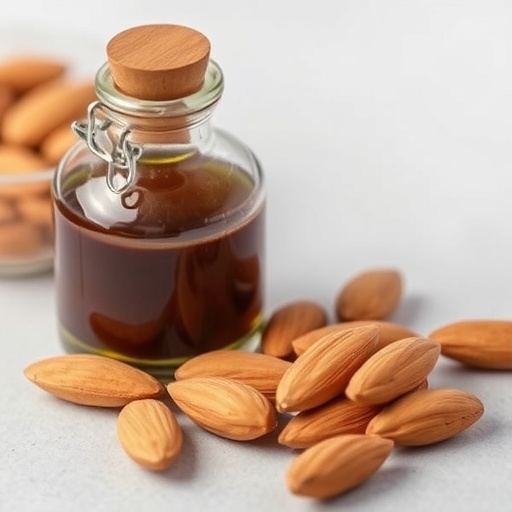In an exciting development within the field of parasitology and alternative medicine, recent research conducted by a team from Bangladesh has shed light on the antileishmanial properties of Prunus amygdalus var. amara, commonly known as bitter almond. This study aims to address the rising incidence of leishmaniasis, a significant public health challenge in various parts of the world, particularly in tropical and subtropical regions. The innovative synergy between conventional pharmaceuticals and natural plant extracts now stands as a beacon of hope in the fight against this debilitating disease.
Leishmaniasis, caused by protozoan parasites of the genus Leishmania, manifests in several forms, ranging from cutaneous manifestations to visceral leishmaniasis, which is often fatal if left untreated. Individuals infected can suffer severe consequences, including skin ulcers and life-threatening organ damage. Traditional treatment options, such as pentavalent antimonials and miltefosine, frequently encounter issues such as drug resistance and adverse side effects, leading to a pressing need for new therapeutic strategies that can complement existing treatments.
The study emphasizes the role of Prunus amygdalus var. amara seed extract, known for its rich phytochemical content, including flavonoids, tannins, and phenolic acids. These bioactive compounds have been recognized for their antioxidant, anti-inflammatory, and antimicrobial activities. The researchers aimed to systematically evaluate the extract’s potential to enhance the efficacy of miltefosine, thereby tackling the dual challenge of drug resistance while leveraging the natural benefits of plant-derived compounds.
In laboratory experiments, the team conducted in vitro assays to measure the effects of varying concentrations of Prunus amygdalus var. amara seed extract on Leishmania parasites. The outcomes were promising. They observed that the extract significantly inhibited the growth and proliferation of these parasitic organisms, with enhanced effects noted when used in combination with miltefosine. This synergistic interaction may represent a novel avenue for developing more effective leishmaniasis treatments.
One of the most striking aspects of this research is the potential for integrating traditional medicine with contemporary therapeutic approaches. The use of plant extracts in modern medicine is not a new concept; however, the systematic approach employed in this study highlights a meticulous consideration for both efficacy and safety. In today’s healthcare landscape, characterized by an increasing shift towards personalized medicine, harnessing the power of botanical extracts could pave the way for tailored therapeutic regimens that resonate with patient preferences and cultural practices.
Furthermore, the implications of this research extend beyond immediate clinical applications. By highlighting natural compounds’ effectiveness alongside established pharmaceutical treatments, the researchers advocate for a paradigm shift in how we view treatment modalities for neglected tropical diseases. Such an approach not only drives scientific innovation but also fosters public awareness of the value of biodiversity. This is particularly relevant given the ongoing threat of biodiversity loss globally.
The critical analysis of the findings reveals a well-rounded understanding of how Prunus amygdalus var. amara seed extract can impact current treatment protocols. By utilizing a naturally derived component that exhibits minimal reported side effects, researchers promote a more holistic framework in which patients are empowered to choose therapies that align with their beliefs and lifestyles. This is especially important in regions where access to healthcare resources is limited.
As the research progresses, further studies are necessary to delve deeper into the pharmacokinetics and bioavailability of Prunus amygdalus var. amara seed extract when used in conjunction with miltefosine. Understanding the optimal dosing and timing will be crucial for maximizing therapeutic outcomes. Moreover, in vivo studies in animal models would provide substantive evidence to support subsequent clinical trials, as real-world efficacy remains to be fully elucidated.
Looking to the future, this research opens avenues for additional studies that could explore the extract’s potential against other infectious diseases. The adaptability of phytochemicals to combat diverse pathogens could significantly enhance our arsenal against not only leishmaniasis but also other diseases currently facing public health crises.
In conclusion, the groundbreaking work by Akand, Rahman, Ali, and their colleagues represents an essential contribution to the field of complementary medicine and infectious disease management. The discovery that Prunus amygdalus var. amara seed extract can enhance the efficacy of miltefosine against Leishmania parasites urges a reevaluation of how natural products can augment modern therapeutics. The collective body of this research serves as a potent reminder of the untapped potential residing within our natural environment, waiting to be discovered and harnessed in the quest for innovative healthcare solutions.
As the scientific community continues to explore this vital intersection of traditional knowledge and modern science, the hope remains alive that more effective, holistic treatments for leishmaniasis and other neglected tropical diseases will emerge. With increasing support for research that embraces both cultural heritage and scientific inquiry, the promise of a healthier future appears brighter than ever. The next steps involve rigorous testing and validation of these findings, underscoring the collaborative effort required to combat global health challenges.
Subject of Research: Prunus amygdalus var. amara seed extract in enhancing antileishmanial activity.
Article Title: Prunus amygdalus var. amara seed extract enhances the antileishmanial activity of miltefosine.
Article References: Akand, S.K., Rahman, A., Ali, R. et al. Prunus amygdalus var. amara seed extract enhances the antileishmanial activity of miltefosine. BMC Complement Med Ther 25, 273 (2025). https://doi.org/10.1186/s12906-025-04958-z
Image Credits: AI Generated
DOI: https://doi.org/10.1186/s12906-025-04958-z
Keywords: Leishmaniasis, Prunus amygdalus var. amara, miltefosine, plant extract, antileishmanial activity, traditional medicine, phytochemicals, public health, drug resistance.




